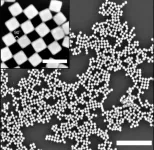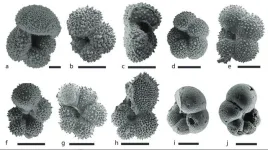(Press-News.org) Australian researchers are developing solutions to recycle solar panels and recover strategic metals including silver and copper.
In Australia alone, it’s estimated more than 100,000 tonnes of solar panels will enter the waste stream by 2035, along with billions of dollars’ worth of materials that could be recaptured.
RMIT University is leading an international network of researchers working to advance the reuse and recycling of solar panels, which can contain valuable materials like lead and tin.
Thursday 13 June was the opening of a work and exhibition space at engineering company EDIPAE’s site in Tomelloso, Spain.
The space is a local hub for researchers and industry to collaborate on how best to recover, use and commercialise valuable materials extracted from recycled solar panels.
EDIPAE director Carlos Miralles Sánchez said as the network’s industry partner in Spain, his company was proud to contribute to a circular economy model for solar panels.
“We now have a physical space to work with researchers on a cheaper and easier recycling solution through this Australian technology,” he said.
“We also have a workshop with tools for creating prototypes so ideas can be developed as well as exhibited to the public.”
The facility houses a public exhibition of the different types of modules and the by-products obtained after recycling them.
EDIPAE will also work with local entities to provide employment and education opportunities.
Technological partner the University of Castilla-La Mancha will use the space to deliver training workshops and conduct research through its Renewable Energy Research Institute.
RMIT’s Dr Ylias Sabri said while solar panels are helping to reduce carbon emissions, the infrastructure to scrap and effectively recycle them once they reach their end of life has been lacking.
“Solar panels have a lifespan of 25 to 30 years and contain valuable metals including silver and copper,” he said.
“But there’s historically been little interest in recovering these strategic metals from discarded panels as it’s difficult and expensive to do, so they end up in landfill.”
It’s hoped technology being developed by Sabri and his team could be part of the solution to improve the economic viability of recycling solar panels.
“RMIT is in a prime position to support this large and growing market and consequent job creation,” Sabri said.
The Integrating End of Life Solar Panel Waste in Circular Economy network is funded by the Australian Government Department of Climate Change, Energy, the Environment and Water (ICIRN000011).
It involves multidisciplinary teams of researchers and industry partners, including New York University, University of Castilla-La Mancha, CSIR-National Physical Laboratory, King's College London, EDIPAE, My Second Life Solar, HP Energy and others.
About RMIT
RMIT is an international university of technology, design and enterprise, with more than 90,000 students and over 11,000 staff globally. The University empowers people and communities to adapt and thrive across generations with education, research and civic engagement that are applied, inclusive and practical. Postgraduate, undergraduate, vocational education, foundation studies and online programs offer students a variety of work-relevant pathways.
Our three substantial campuses in Melbourne, Australia are located in the City, Brunswick and Bundoora, along with other Victorian locations. We also have two campuses (Saigon South and Hanoi) and an English language centre in Vietnam and a research and innovation hub in Spain. In addition, programs are offered through partners in Singapore, Hong Kong, Sri Lanka, Indonesia, India and China, with research and industry partnerships across the globe.
END
Australian solar panel recycling tech on show in Spain
Australian researchers are developing solutions to recycle solar panels and recover strategic metals including silver and copper
2024-06-13
ELSE PRESS RELEASES FROM THIS DATE:
Bhatia named new head of ITER projects at PPPL
2024-06-13
Ravinder Bhatia, a leader and engineer with three decades of experience managing collaborative science initiatives, is the new head of ITER projects at the U.S. Department of Energy’s Princeton Plasma Physics Laboratory (PPPL).
In this role, Bhatia oversees the design and fabrication of six diagnostic systems, or sensor systems, that PPPL is building for ITER, the multinational facility under assembly in France to study plasma that can heat itself and sustain its own fusion reactions. The diagnostics will observe the plasma within ITER to measure properties that include temperature, ...
The Davos Alzheimer’s Collaborative launches global effort to streamline diagnosis of Alzheimer’s disease and related dementias
2024-06-13
The Davos Alzheimer’s Collaborative (DAC), the global organization seeking to cure Alzheimer’s disease and dementia, today announced a new initiative in health systems in five countries to deploy blood biomarkers (BBMs) and confirmatory diagnostic testing to increase timely and accurate diagnosis of Alzheimer’s disease and related dementias (ADRD). Led by the DAC Healthcare System Preparedness (DAC-SP) team, the Accurate Diagnosis project is the first-ever global implementation research program to study the use of blood biomarkers as part of the ADRD diagnostic ...
Nanosized blocks spontaneously assemble in water to create tiny floating checkerboards
2024-06-13
Researchers have engineered nanosized cubes that spontaneously form a two-dimensional checkerboard pattern when dropped on the surface of water. The work, published in Nature Communications, presents a simple approach to create complex nanostructures through a technique called self-assembly.
“It’s a cool way to get materials to build themselves,” said study co-senior author Andrea Tao, a professor in the Aiiso Yufeng Li Family Department of Chemical and Nano Engineering at the University of California San Diego. “You ...
University of Colorado co-leads multicenter randomized trial identifying method of emergency intubation preoxygenation to decrease risk of hypoxemia and cardiac arrest
2024-06-13
In current clinical care, most critically ill adults undergoing emergency tracheal intubation receive preoxygenation through an oxygen mask. Administering supplemental oxygen to patients prior to the start of an intubation procedure increases the oxygen content in the patient’s lungs and decreases the risk of hypoxemia, low levels of oxygen in the blood. However, hypoxemia occurs during 10% to 20% of tracheal intubations in the emergency department or intensive care unit and may lead to cardiac arrest and death.
The University of Colorado co-led a trial with Vanderbilt University that compared the two most ...
Quantum data assimilation: A quantum leap in weather prediction
2024-06-13
Data assimilation is a mathematical discipline that integrates observed data and numerical models to improve the interpretation and prediction of dynamical systems. It is a crucial component of earth sciences, particularly in numerical weather prediction (NWP). Data assimilation techniques have been widely investigated in NWP in the last two decades to refine the initial conditions of weather models by combining model forecasts and observational data. Most NWP centers around the world employ variational and ensemble-variational data assimilation methods, which iteratively reduce cost functions via gradient-based optimization. However, these methods require significant computational resources.
Recently, ...
Ancient ocean slowdown warns of future climate chaos
2024-06-13
When it comes to the ocean’s response to global warming, we’re not in entirely uncharted waters. A UC Riverside study shows that episodes of extreme heat in Earth’s past caused the exchange of waters from the surface to the deep ocean to decline.
This system has been described as the "global conveyer belt," because it redistributes heat around the globe through the movement of the ocean waters, making large portions of the planet habitable.
Using tiny, fossilized shells recovered from ancient deep-sea sediments, the study in the Proceedings of the National Academy of Sciences demonstrates how the conveyor belt responded around 50 ...
Pre-operative use of GLP-1s may reduce complications after metabolic and bariatric surgery in patients with extreme obesity
2024-06-13
SAN DIEGO – June 13, 2024 – A combination of GLP-1 agonists taken before metabolic and bariatric surgery may help patients with extreme obesity lower the risk of post-operative complications, according to a new study* presented today at the American Society for Metabolic and Bariatric Surgery (ASMBS) 2024 Annual Scientific Meeting
Patients with extreme obesity, a body mass index (BMI) of 70 or more, face a higher risk of complications from surgery compared to patients with lower BMIs. Studies have shown weight loss before surgery can mitigate risk but lifestyle intervention ...
Why many lung cancer patients who have never smoked have worse outcomes
2024-06-13
The reason why targeted treatment for non-small cell lung cancer fails to work for some patients, particularly those who have never smoked, has been discovered by researchers from UCL, the Francis Crick Institute and AstraZeneca.
The study, published in Nature Communications, shows that lung cancer cells with two particular genetic mutations are more likely to double their genome, which helps them to withstand treatment and develop resistance to it.
In the UK, lung cancer is the third most common type of cancer and the leading cause of cancer death. Around 85% of patients with lung cancer have non-small cell lung cancer (NSCLC), and this is the most common type found in patients ...
APA poll finds younger workers feel stressed, lonely and undervalued
2024-06-13
Younger workers are struggling with feelings of loneliness and a lack of appreciation at work and tend to feel more comfortable working with people their own age, according to a survey by the American Psychological Association.
The 2024 Work in America survey, conducted online by The Harris Poll of more than 2,000 working U.S. adults, found that three in 10 U.S. workers reported that people in their organization who are not close to their age do not see the value in their ideas (32%). That number was significantly higher for workers aged ...
Shedding light on the state of genetic counseling for hereditary transthyretin-related amyloidosis
2024-06-13
Early detection and treatment of hereditary transthyretin-related amyloidosis via genetic counseling are crucial. Yet, not all at-risk individuals seek genetic counseling, and management for presymptomatic carriers remains unclear. To tackle these knowledge gaps, a research team from Japan conducted a retrospective study on over 200 people who sought genetic counseling at a medical center, shedding light on the current advantages and limitations of current practices.
Hereditary transthyretin-related amyloidosis (AATRv amyloidosis) is a rare inherited ...
LAST 30 PRESS RELEASES:
EANM launches new award to accelerate alpha radioligand therapy research
Globe-trotting ancient ‘sea-salamander’ fossils rediscovered from Australia’s dawn of the Age of Dinosaurs
Roadmap for Europe’s biodiversity monitoring system
Novel camel antimicrobial peptides show promise against drug-resistant bacteria
Scientists discover why we know when to stop scratching an itch
A hidden reason inner ear cells die – and what it means for preventing hearing loss
Researchers discover how tuberculosis bacteria use a “stealth” mechanism to evade the immune system
New microscopy technique lets scientists see cells in unprecedented detail and color
Sometimes less is more: Scientists rethink how to pack medicine into tiny delivery capsules
Scientists build low-cost microscope to study living cells in zero gravity
The Biophysical Journal names Denis V. Titov the 2025 Paper of the Year-Early Career Investigator awardee
Scientists show how your body senses cold—and why menthol feels cool
Scientists deliver new molecule for getting DNA into cells
Study reveals insights about brain regions linked to OCD, informing potential treatments
Does ocean saltiness influence El Niño?
2026 Young Investigators: ONR celebrates new talent tackling warfighter challenges
Genetics help explain who gets the ‘telltale tingle’ from music, art and literature
Many Americans misunderstand medical aid in dying laws
Researchers publish landmark infectious disease study in ‘Science’
New NSF award supports innovative role-playing game approach to strengthening research security in academia
Kumar named to ACMA Emerging Leaders Program for 2026
AI language models could transform aquatic environmental risk assessment
New isotope tools reveal hidden pathways reshaping the global nitrogen cycle
Study reveals how antibiotic structure controls removal from water using biochar
Why chronic pain lasts longer in women: Immune cells offer clues
Toxic exposure creates epigenetic disease risk over 20 generations
More time spent on social media linked to steroid use intentions among boys and men
New study suggests a “kick it while it’s down” approach to cancer treatment could improve cure rates
Milken Institute, Ann Theodore Foundation launch new grant to support clinical trial for potential sarcoidosis treatment
New strategies boost effectiveness of CAR-NK therapy against cancer
[Press-News.org] Australian solar panel recycling tech on show in SpainAustralian researchers are developing solutions to recycle solar panels and recover strategic metals including silver and copper







